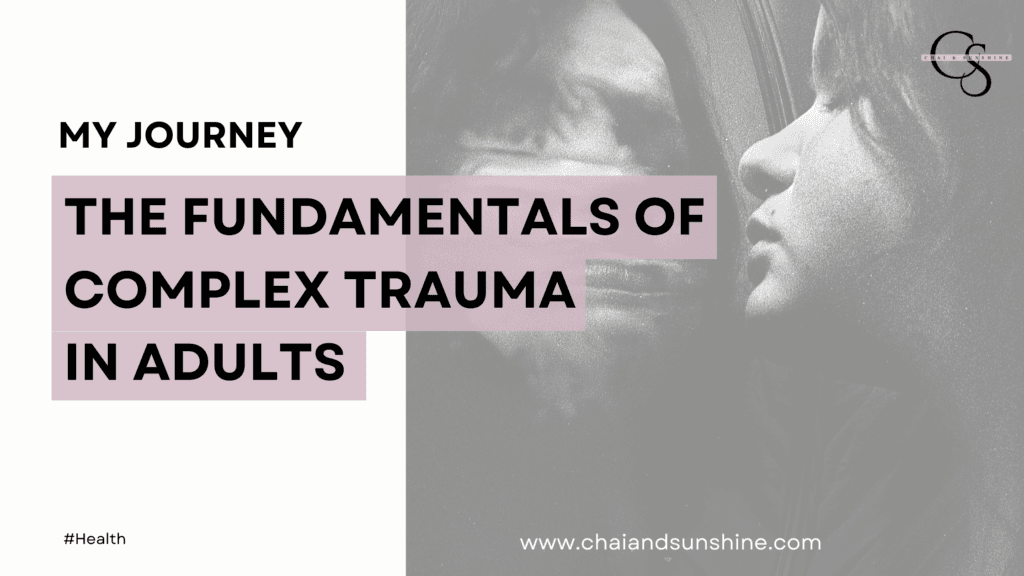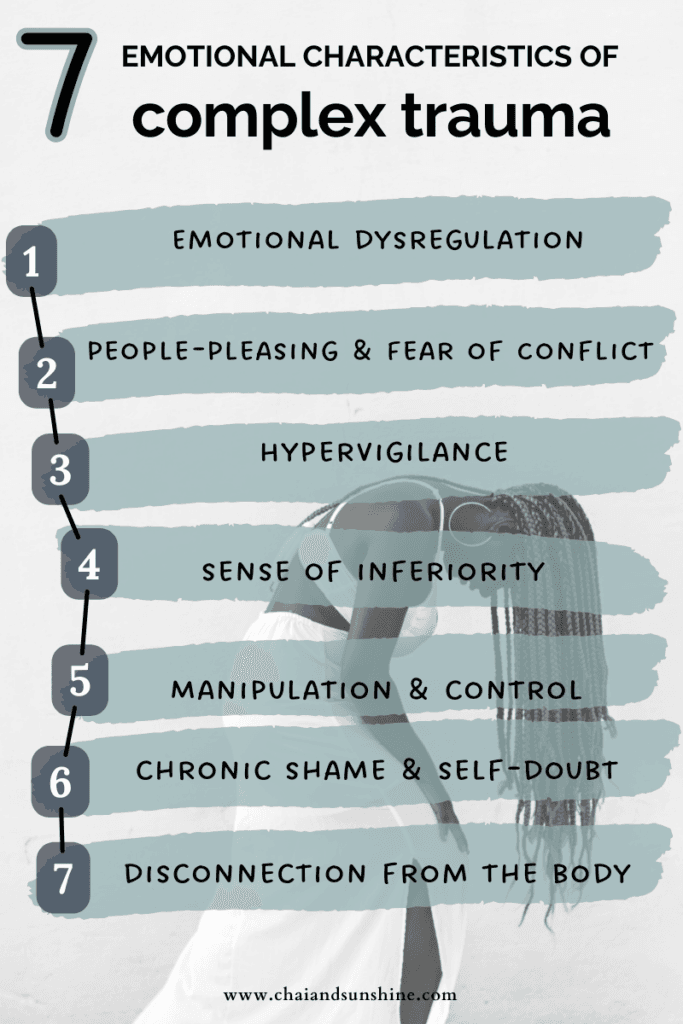The Fundamental of Complex Trauma in Adults: My Personal Journey

Becoming a mother changes you in profound ways. But for me, it wasn’t the glowing transformation of joy that social media likes to portray. When I gave birth to my twins, I experienced what felt like a complete unravelling of everything I thought I knew about myself.
It wasn’t just the sleepless nights or the overwhelming responsibility of caring for two new lives. Rather, I felt as if every unresolved part of my past came rushing to the surface all at once. Every hurt, every defense mechanism, and every suppressed feeling began demanding my attention.
But my breaking point also became my turning point.
Through a lot of hard, messy work, I’ve come to understand that I wasn’t broken or defective. What I was experiencing was the aftermath of complex trauma, and I now know that it’s not only possible to heal from it, but that the process of healing can lead to a richer, more authentic life.
In this post, I want to share the fundamentals of complex trauma in adults—what it is, how it manifests, and why it’s so often overlooked. And for those in the thick of it, I want to reassure you that you’re not alone and that healing is absolutely possible.
Let’s go!
Table of Contents
ToggleWhat is Complex Trauma?
It wouldn’t be a “fundamentals of complex trauma in adults” if I didn’t try to give some sort of definition of complex trauma.
Complex trauma isn’t about a single, catastrophic event.
Instead, it arises from prolonged exposure to emotionally or psychologically harmful environments, often during formative years. It’s rooted in relationships, particularly those where trust and safety should exist but don’t.
Unlike the “big T” Traumas, such as one-off natural disasters or violent assaults, complex trauma is cumulative and insidious, often involving neglect, emotional invalidation, or manipulation.
Here’s how I like to think about it:
- Big T events are things that happen to you when they shouldn’t.
- Little T traumas often involve things that don’t happen when they should—like the absence of love, respect, attention, security, reliability, or safety.
- Sometimes, complex trauma can be a combination of both big T and little T trauma. (Yikes!)
Over time, these repeated absences can have the same or even greater effects as big T trauma. This is because they are subtle, hard to detect, and often invalidated or overlooked by others.
For many of us, it’s easy to downplay our experiences. My childhood, for instance, seemed perfectly adequate on the surface. I was well provided for materially, and from the outside, my family appeared stable.
But beneath that veneer were years of emotional neglect and dysfunction—parents who could be invalidating, neglectful, and emotionally absent. These experiences taught me to people-please, to fear confrontation, and to internalise a sense of unworthiness. I was super confused, for years, around why I just couldn’t get my sh*t together.

Characteristics & Fundamentals of Complex Trauma in Adults
Educating yourself about the characteristics of complex trauma is often the first step to healing.
Understanding how these traits may have developed as responses to certain elements in your formative years can help alleviate the confusion, self-blame, and anger you might feel.
My Complex Trauma Bible is Tim Fletcher’s “60 Characteristics of Complex Trauma“, which provides a comprehensive framework for understanding how it impacts adults. He has a series on YouTube as well. It’s changed my life!
Here, I’ll highlight some key ways it showed up in my life and how it might manifest for others:
For years, I felt like my emotions controlled me rather than the other way around. Either that, or I’m completely shut down – robot style.
I’d swing between anxiety, sadness, and determination in a short period.
Small frustrations, like a rude comment or an unexpected change in plans, could leave me spiralling for hours or days.
This emotional volatility is the one thing that bonds all of us complex trauma people together. We just don’t know how to regulate our emotions! How could we? We were never taught (but it’s not too late).
2. People-Pleasing and Fear of Conflict
Growing up, there was only room for my father’s anger and demands in the house. So, I learned that avoiding conflict was safer than asserting my needs.
As an adult, this translated into people-pleasing behaviours:
- Saying “yes” when I wanted to say “no.”
- Changing my character, accent, and entire personality depending on the person.
- Bending over backwards to avoid upsetting others (which sometimes involved manipulation!).
The very thought of confrontation could leave me paralysed with fear.
3. Hypervigilance
Are you an Empath/ Highly Sensitive Person? Well, you might have complex trauma!
Complex trauma keeps you on high alert, constantly scanning for potential threats. It’s a body’s nervous system trying to figure out fight-flight-freeze-fawn responses.
So, I’d replay conversations in my head, analysing every word for hidden meanings or signs of disapproval. And eventually, I became a “highly sensitive person” or “empath“.
Not someone who would cry at the drop of the hat (this was not allowed in my childhood home). But rather someone who could infer how a person felt from a simple look or micro-expression.
People admired this about me. “Wow, you’re so perceptive!” But damn, what a price to pay for being observant.
This hyper-awareness is exhausting and makes it very difficult to relax.
4. Sense of Inferiority
No matter how many external achievements I racked up—from academic successes to professional milestones—I couldn’t shake the belief that I was fundamentally “less than.”
Whether I based it on my race and ethnicity, or my gender, or my nationality – you name it, I was feeling less than.
Sure, there’s a component of social hierarchies, structural racism, and actual discrimination going on.
But because I didn’t have a strong enough sense of self, I couldn’t maintain my sense of self-worth when the world attached it.
This inferiority complex wasn’t rational, but it was deeply ingrained.
5. Manipulation and Control
In my efforts to avoid vulnerability, I’d sometimes resort to manipulative behaviours.
Machiavellian manoeuvres to subtly steer conversations. A touch of gaslighting. A little defensiveness to avoid conflict or embarrassment. And never apologising!
I realise now that these were all behaviours born out of fear. A fear that I couldn’t handle things if I didn’t control them.
Fear that I would experience shame, abandonment or conflict if I didn’t move through the world orchestrating conversations, suggesting actions, and planting ideas.
My husband helped me through this one by teaching me how to communicate my needs. And then listening, without judgment, when I expressed mine. Without those communication tools, I would be completely lost.
6. Chronic Shame and Self-Doubt
Tim Fletcher believes that shame is at the root of a lot of complex trauma and their symptoms. After doing a lot of my own work, I have to agree.
Shame, in my case, was a constant companion, whispering that I was cruel, callous, and unloving—even when I rationally knew these thoughts aren’t true.
But I’ve very recently realised that this is the internalised voice of a critic. And that I’ve been living with a mental and emotional abuser in my head for all these years.
7. Disconnection from the Body
For years, I didn’t realise how disconnected I was from my physical self. I’d suppress my needs—ignoring hunger, exhaustion, or pain—because I’d learned to dismiss my body’s signals as unimportant.
Heck, I didn’t even go to the toilet as often as I needed to, choosing instead to “hold it in”. And I held my breath and wore uncomfortable clothing because I wasn’t in touch with my body.
Now, with somatic therapies, I’m slowly coming to feel myself as my whole body. Not just the mental activity that goes on in my head.
—
These are just a few examples, but the manifestations of complex trauma are incredibly diverse.
Other common symptoms include difficulty trusting others, perfectionism, chronic feelings of emptiness, and struggles with intimacy.

The Role of Invalidating Yourself
Part of the fundamentals of complex trauma in adults is self-invalidation.
You might think, “I didn’t experience abuse or violence. My childhood wasn’t that bad. I don’t have a right to feel this way.”
But trauma isn’t about the severity of the events. it’s about how those events made you feel and more importantly, whether or not you had the support to process those feelings.
For years, I dismissed my struggles because I didn’t think they “counted.”
I’d tell myself I was being dramatic or ungrateful, which only deepened my shame and isolation.
It wasn’t until I began acknowledging my pain—without comparing it to anyone else’s—that I could start healing.
So, do yourselves a favour and just listen to your pain the way you wished a loved one would’ve listened to you.
Why It’s So Often Overlooked
The fundamentals of complex trauma in adults often goes unrecognised because it’s so intertwined with “normal” life.
Traits like perfectionism, overachievement, or chronic busyness are sometimes celebrated in our society, masking the pain driving them.
Additionally, many of us don’t associate our symptoms—like anxiety, depression, or relationship difficulties—with past experiences. Instead, we attribute them to personal failings or current stressors.
Cultural factors also play a role. In many communities, mental health struggles are stigmatised or minimised.
Growing up African, I often heard phrases like “Just toughen up” or “Other people have it worse,” which reinforced the idea that my feelings weren’t valid.
Or, an Ethiopian favourite, “an unbeaten child will cry when he is shouted at”. Make of that what you will.
The Hope of Healing
Healing from complex trauma is not a life sentence. At least I hope its not, because sometimes it sure can feel like it.
It’s a long and challenging process, but I believe it is absolutely possible. Even though I’m down in the trenches with y’all.
So, I’ll be doing a second post to share my messy, ongoing journey through complex trauma, as it deserves its own space to be explored in depth.
For now, I hope this introduction offers clarity and hope, helping you feel less alone and more empowered to start or continue your own path to healing.
If you’re reading this and recognising parts of yourself in my story, I want you to know that you’re not alone, and you’re not beyond help. Complex trauma can feel like a tangled web, but with time, compassion, and support, it is possible to untangle it and create a life rooted in authenticity and joy.
Remember: your pain is valid, your feelings matter, and your healing is worth every ounce of effort.
Let’s continue this conversation. Share your thoughts or experiences in the comments, or reach out if you have questions. Together, we can break the silence around complex trauma and create spaces for collective healing.

[…] self-comparison, I think they are very limited, particularly when you have underlying issues like C-PTSD, depression, or […]